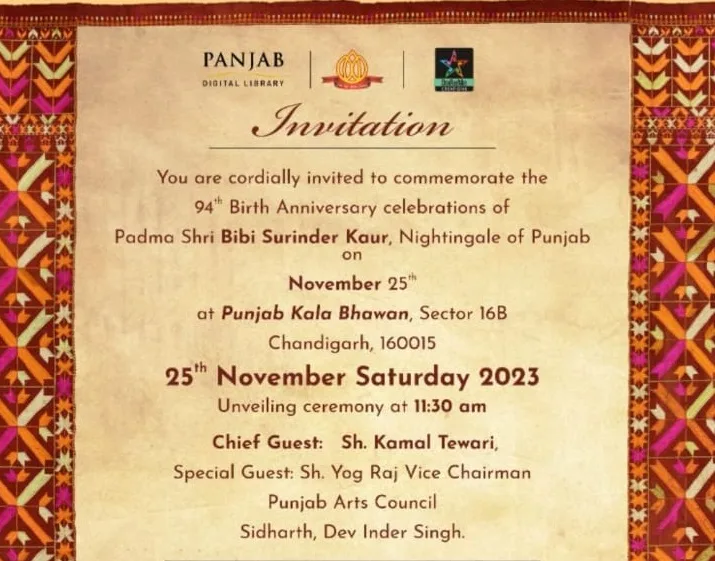Monitoring Desk: The 94th Birth Anniversary of Padma Shri Bibi Surinder Kaur will be celebrated on November 25 in Chandigarh India.
Surinder Kaur who is known as the “Nightingale of Punjab” was born in Lahore on November 25, 1929, and was raised with her four sisters and five brothers at Bashan Street Chuburji Lahore. Her father was a chemistry professor at Government College Lahore. Surinder Kaur was an urban Punjabi girl from Lahnda Punjab (West Punjab) who was raised in a well-educated family in Lahore city but contributed her whole life to documenting and saving classical Punjabi language and collective Punjabi consciousness through her songs. She did her matriculation at Arya Nagar Girls High School Lahore which was an English Medium School and was in the vicinity of Choburji Garden.
After the division of the Indo-subcontinent in 1947, Surinder Kaur and her parents relocated to Ghaziabad, Delhi. She was married to Prof. Joginder Singh Sodhi, who was born and raised in Gujranwala. Spotting her surprising talent, Prof. Joginder Singh Sodhi became her support system, and soon she started a career as a playback singer in the Hindi film industry in Bombay, introduced by music director, Ghulam Haider. She got an extraordinary response for her Hindi and Urdu songs in the 1948 film Shaheed, including “Badnam Na Ho Jaye Mohabbat Ka Fasaana”, “Aanaa hai tu aajaao” and “Taqdeer ki aandhi” and “Hum kahaan aur thum kahaan”. However, her soul was connected with Punjab and Punjabi, and she eventually moved back to Delhi in 1952 and dedicated her life to reviving Punjabi songs. Got fame from singing Hindi and Urdu songs, Surinder Kaur decided to switch to Punjabi when she was the most popular voice of Urdu and Hindi songs. The force behind her decision was to preserve, promote, and document the Punjabi language. She thought that the Punjabi language was losing its social status and classical diction was vanishing from songs and literature. Her contribution to the Punjabi language is yet to be documented properly.
Her husband Prof. Joginder Singh Sodhi was an activist and popular among communists of India and his residence was a popular “Baithik” (sitting place for guests) for left-wingers. The Indian People’s Theatre Association (IPTA), which was an arm of the Indian Communist Party in Punjab was strongly supported by the couple through their appearances in remote villages of East Punjab and both helped IPTA socially and economically. Both collaborated on compositions such classics as “Chan Kithe Guzari Aai Raat,” “Lathe Di Chadar,” “Shonkan Mele Di,” and “Gori Diyan Jhanjran”, “Sarke-Sarke Jandiye Mutiare”. However, she would be remembered for all times to come for her duel with her sister Parkash Kaur for Punjabi folksong “Mavan te dhiya ral biathya ni maye”, that was recorded on Radio Pakistan Lahore in 1943 and is still the best-ever written and sung song representing anthropological aspects of the mother-daughter relationship of agrarian Punjab and still makes Punjabi mothers and daughters cry while listening this song.

The celebration would start at Punjab Kala Bhawan Chandigarh while Kamal Tewari would be the chief guest and Yog Raj Vice Chairman of Punjab Arts Council would be a special guest. The ceremony of Book Launch by Lakhwinder Johol would be part of the event along with a live painting session.
